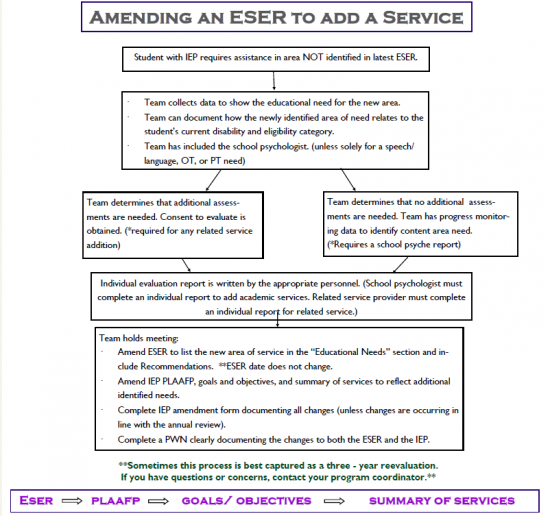There are situations where teams must take into consideration student concerns that may or may not seem disability related when making eligibility determinations. Some of these include student absences, illegal activity and seeming willful misconduct. Here are some tips for guidance.
![]() Absences: Clearly document any evidence that the absences are not caused by the student’s educational disability. Meet with the team to determine if absences are caused by or have a direct relationship to a disability. Excessive absences do not automatically “disqualify” a student from being considered for eligibility for special education services. **Absences of an already identified student should trigger an IEP meeting possible amendment—call in the team if they are chronic.
Absences: Clearly document any evidence that the absences are not caused by the student’s educational disability. Meet with the team to determine if absences are caused by or have a direct relationship to a disability. Excessive absences do not automatically “disqualify” a student from being considered for eligibility for special education services. **Absences of an already identified student should trigger an IEP meeting possible amendment—call in the team if they are chronic.
![]() Illegal activity: Clearly document any evidence that the student is engaging in illegal drug activities or other illegal activities. Should be considered as you look at the student’s overall conduct within the school setting.
Illegal activity: Clearly document any evidence that the student is engaging in illegal drug activities or other illegal activities. Should be considered as you look at the student’s overall conduct within the school setting.
![]() Misconduct:
Misconduct:
![]() Look for and clearly document examples of the student being able to control his/her actions. Does the student have behavior issues ONLY in certain classes? Can the student control his/her behavior during football or other sports’ seasons? Does the student control his/her behavior prior to preferred activities (field trips, class parties, etc.)?
Look for and clearly document examples of the student being able to control his/her actions. Does the student have behavior issues ONLY in certain classes? Can the student control his/her behavior during football or other sports’ seasons? Does the student control his/her behavior prior to preferred activities (field trips, class parties, etc.)?
![]() Look for and clearly document evidence of forethought and planning prior to the misconduct. Did the student clearly plan the execution of the misbehavior? Did the student tell others that he/she was going to engage in misconduct prior to the event? Was it necessary for the student to purchase or otherwise obtain materials in order to engage in the misbehavior?
Look for and clearly document evidence of forethought and planning prior to the misconduct. Did the student clearly plan the execution of the misbehavior? Did the student tell others that he/she was going to engage in misconduct prior to the event? Was it necessary for the student to purchase or otherwise obtain materials in order to engage in the misbehavior?
![]() Look for and clearly document evidence of deliberate, volitional and willful misbehavior (e.g., student’s statements to others before/ after incidents of misconduct).
Look for and clearly document evidence of deliberate, volitional and willful misbehavior (e.g., student’s statements to others before/ after incidents of misconduct).
**Just because a student may be eligible under Emotional Disturbance doesn’t mean that everything they do is caused by the disability. Look at why the student is eligible under Emotional Disturbance.
![]() Other:
Other:
![]() Clearly delineate between “social maladjustment” and “emotional disturbance” in making eligibility determinations. Your school psychologist will do this with all of the data gathered from team members.
Clearly delineate between “social maladjustment” and “emotional disturbance” in making eligibility determinations. Your school psychologist will do this with all of the data gathered from team members.
![]() Clearly distinguish between “disability” and “disorder or impairment” in making eligibility determinations—particularly when determining if eligible for IDEA or 504.
Clearly distinguish between “disability” and “disorder or impairment” in making eligibility determinations—particularly when determining if eligible for IDEA or 504.
![]() Consider any additional evaluations that are offered by the parent to determine if the student is qualified under any other eligibility categories. Always consider evaluations that parents bring in to the school and document that they have been reviewed and how the team will use them.
Consider any additional evaluations that are offered by the parent to determine if the student is qualified under any other eligibility categories. Always consider evaluations that parents bring in to the school and document that they have been reviewed and how the team will use them.
![]() Don’t allow your temper or judgments to cloud your focus! Kids first!
Don’t allow your temper or judgments to cloud your focus! Kids first!
Each eligibility decision is based on the individual’s needs. It is important to remember that what is willful for one student may uncontrollable for another. This is what makes these decisions difficult. That is why you have a team!
Jacobs, M. (2013, January). Eligible or Not? Potential “Rule-Out Factors Under the IDEA and Section 504. Presented as a webinar for LRP Publications.
